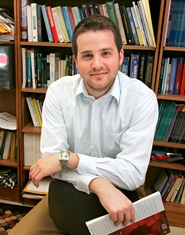Where are they now?
|
More AlumniKathryn BerlinAndres E. Carrillo Aleda Chen Krista Cline Katie Hill Gallant Megan Gilligan Kimberly Hurley Heidi IglayReger Jessica Kelley Seoyoun Kim Min-Ah Lee Mary Marshall Megan MacPherson Lauren Parker Lindsay Pitzer Markus Schafer Jori Sechrist Amber Seidel Tetyana P. Shippee John Spruill III April J. Stull Anusha Sundarrajan Roland J. Thorpe Kyle Timmerman Nicholas Turiano Lori Ward Oliver Wendt Lindsay Wilkinson Tim Wright |
Nicholas Turiano, PhDNicholas Turiano received a Dual-Title PhD in Human Development and Family Studies and Gerontology in 2012. He is currently a NRSA postdoctoral fellow at the University of Rochester Medical Center. His research focuses on the interplay between personality traits, behavior, and physiology. He is now identifying behavioral risk factors that contribute to inflammation, disease, and earlier mortality. What do you remember best about your time in the Center on Aging and the Life Course?The camaraderie shared among CALC students was the most memorable aspect of my time at Purdue. CALC courses were fun because there were so many students from various departments and different areas of expertise. After Hanley Hall opened, this camaraderie grew even stronger because of the many students sharing office space in the building. From statistical advice to just sharing a laugh with each, I truly miss my time spent with other CALC students. How did you get interested in the study of aging?As part of an undergraduate degree requirement, I completed a full-time semester-long internship as an activities coordinator at a Continuing Care Retirement Community (CCRC). While I was exposed to individuals in various levels of care, I found it fascinating that some individuals were in their nineties and still functioning like their 60 year old counterparts. This experience sparked my interest in identifying why some individuals aged more successfully while others experienced increased disability and disease. The dual-title Gerontology doctoral program at Purdue was the deciding factor in my choice of a graduate program because I knew the program would enable me to understand the intricate aging process. Who were your mentors and how did they help you succeed?Drs. Daniel Mroczek and Kenneth Ferraro each provided unique guidance throughout my graduate training. Dr. Mroczek was my primary mentor and from the first day I arrived at Purdue he really stressed the importance of developing strong statistical skills. It is this foundation of statistical knowledge that gives me the confidence to test new ideas and further the field of personality and health. Dr. Ferraro was critical in helping me identify and disseminate the “big picture” of my research. Through courses, meetings, and conference discussions, he always stressed the importance of clearly articulating my research in a confident and concise manner. Drs. Mroczek and Ferraro are just two of the many colleagues that helped shaped my research career and I look forward to a productive future collaborating. What experiences did you have at Purdue that helped form your current career?The primary influence CALC has had on my career is the interdisciplinary approach to research and teaching. The word “interdisciplinary” is often just a catch-word used by many institutions, but CALC embodies this type of training. The coursework and perspectives I achieved through disciplines such as Psychology, Sociology, Endocrinology, and Anthropology have made me a well-rounded researcher and actually helped me during my transition into my postdoctoral fellowship in a medical center. I am surrounded by individuals from diverse backgrounds and it was essential to be exposed to this at Purdue and learn how to foster collaborations with individuals outside my area of study. One of the most important opportunities I had through CALC was being on the T-32 fellowship, which allowed me the opportunity to publish. This publishing experience during graduate school has really aided my ability to publish quality work in high impact journals during my postdoc. Anything else you would like to add?Other than the outstanding academic training provided by CALC, I was also trained on how to be a professional. How to review manuscripts, proper etiquette at conferences, and how to negotiate job offers are just a few examples of how CALC taught professionalism to students. This type of advice is not often addressed in the typical classroom setting, but it is essential in becoming a successful academic. I can’t stress enough how much I enjoyed my 5 years working with CALC faculty associates and graduate students! |
